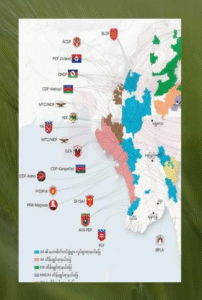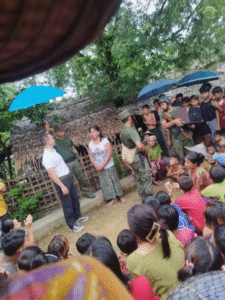AA’s Strategic Undermining of NUG: views of others and our MMNN’s Analysis
DARZKKG
Key Allegations
- Author Khaing Aung Kyaw, a known supporter of the Arakan Army (AA), is accused of deliberately undermining the National Unity Government (NUG) to cause its collapse.
- Extremist Rakhine Monk U Kawnthala is reportedly urging NUG to submit under AA’s leadership, suggesting a reversal of the current power structure.
These actions are interpreted as part of a broader AA strategy to dominate the revolutionary movement and sideline NUG’s authority.
Core Message of the Post (Translated Summary)
- December 28 marks the birthday of Sayadaw U Uttama, and coincidentally, the military junta plans to hold elections on that day.
- Opposition groups are protesting the elections, especially in territories currently under junta control.
- The author criticizes NUG for not understanding the current geopolitical and territorial realities, implying that their objections to the elections are misguided.
- The junta plans to hold elections in towns and villages under its control, with candidates competing for parliamentary seats. Whether people support them or not, voting will proceed.
- The post emphasizes that voting is optional, but questions the health and security guarantees of the candidates.
- If the junta completes the election, it will form a government with a president—likely Min Aung Hlaing, chosen by military-aligned MPs.
- A potential power struggle is predicted between Min Aung Hlaing and U Khin Yi (of the USDP), both vying for the presidency.
- The post accuses NUG of corruption, false promises, and failing to dismantle the “China Pipeline”—a metaphor for the junta’s strategic lifeline.
- It claims that NUG and its armed wing (PDFs) have avoided attacking this pipeline, allowing the junta’s election plans to proceed unhindered.
- The author argues that if the pipeline were destroyed, Min Aung Hlaing’s government would collapse.
- Instead of casualty reports from airstrikes, the public wants to hear news of the pipeline’s destruction.
- The post concludes that dismantling the China Pipeline is the most critical step to ending military dictatorship in Myanmar.
Thematic Interpretation: AA’s Plot
- The post aligns with a narrative that AA and its affiliates are positioning themselves as the dominant force, while subtly discrediting NUG.
- By portraying NUG as ineffective and corrupt, and by calling for strategic shifts that favor AA’s model (e.g. decentralized command, regional control), the author reinforces AA’s legitimacy.
The call to destroy the China Pipeline is framed as a revolutionary necessity—but the implication is that NUG has failed to act, while AA or its proxies might be better suited to lead such efforts.
Strategic Rebuttal from the NUG Perspective
Title: Reclaiming the Narrative — A Response to AA-Aligned Undermining
The National Unity Government (NUG) recognizes the importance of unity, transparency, and strategic clarity in the fight against Myanmar’s military dictatorship. Recent narratives pushed by AA-aligned voices—such as Khaing Aung Kyaw and extremist Rakhine clergy—suggest that NUG should submit to AA’s leadership or abandon its current structure. These calls are not only misguided but strategically dangerous.
Here’s why:
1. NUG’s Legitimacy Is Democratic, Not Ethnic
NUG was formed through a coalition of elected representatives, civil society leaders, and ethnic stakeholders. It is not an ethnic army—it is a civilian-led government representing the will of the people across all regions and ethnicities. To subordinate NUG under AA would be to replace democratic legitimacy with militarized ethnic dominance.
2. Fragmentation Weakens the Revolution
AA’s model of nurturing proxy forces outside NUG’s Chain of Command may serve its regional interests, but it undermines national cohesion. The revolution cannot succeed if each region operates in isolation. NUG’s CoC is designed to ensure accountability, coordination, and strategic unity.
3. The China Pipeline Is Not Just a Target—It’s a Leverage Point
Critics accuse NUG of failing to dismantle the China-backed pipeline. But NUG’s approach is not reckless sabotage—it’s strategic diplomacy. The pipeline is a geopolitical lever. Destroying it prematurely could alienate key international actors and provoke retaliation without yielding meaningful gains.
4. AA’s “Shield Wall” Proposal Is Welcome—But Must Be Mutual
If AA genuinely seeks a “shield wall” strategy, it must integrate with NUG’s broader revolutionary framework. That means respecting the CoC, sharing intelligence, and aligning objectives. A fragmented shield is no shield at all.
5. The People Deserve More Than Cartoons and Criticism
General Gun Maw’s cartoon may be symbolic, but real leadership demands more than symbolism. NUG is actively engaging youth, coordinating PDFs, and building international support. The revolution is not a race for dominance—it’s a fight for freedom.
The China Pipeline Metaphor: Geopolitical Implications
The “China Pipeline” refers to the dual oil and gas pipelines running from Kyaukphyu (Rakhine State) to Kunming (China), a critical component of Beijing’s Belt and Road Initiative (BRI). But metaphorically, it represents far more:
1. Strategic Lifeline for the Junta
- The pipeline provides revenue, energy, and geopolitical cover for the military regime.
- China’s interest in pipeline security often translates into tacit support for junta stability.
2. Diplomatic Leverage for NUG
- NUG’s restraint in targeting the pipeline is not weakness—it’s strategic calculation.
- Damaging the pipeline could trigger Chinese intervention or loss of diplomatic channels.
3. Symbol of Sovereignty vs. Subjugation
- For AA, controlling Kyaukphyu means controlling the pipeline—thus asserting regional power.
- For NUG, the pipeline is a test of national sovereignty: can Myanmar’s future be shaped without foreign domination?
4. Potential Flashpoint
- If the pipeline becomes a battleground, it could escalate into a regional crisis.
- India, ASEAN, and Western powers are watching closely—any disruption could shift alliances.
Final Thought
The revolution’s success depends not on who leads, but on how we lead—together. NUG must remain the nucleus of democratic resistance, while welcoming strategic partnerships that respect its legitimacy. AA’s ambitions are valid, but they must align with the national cause, not override it.





